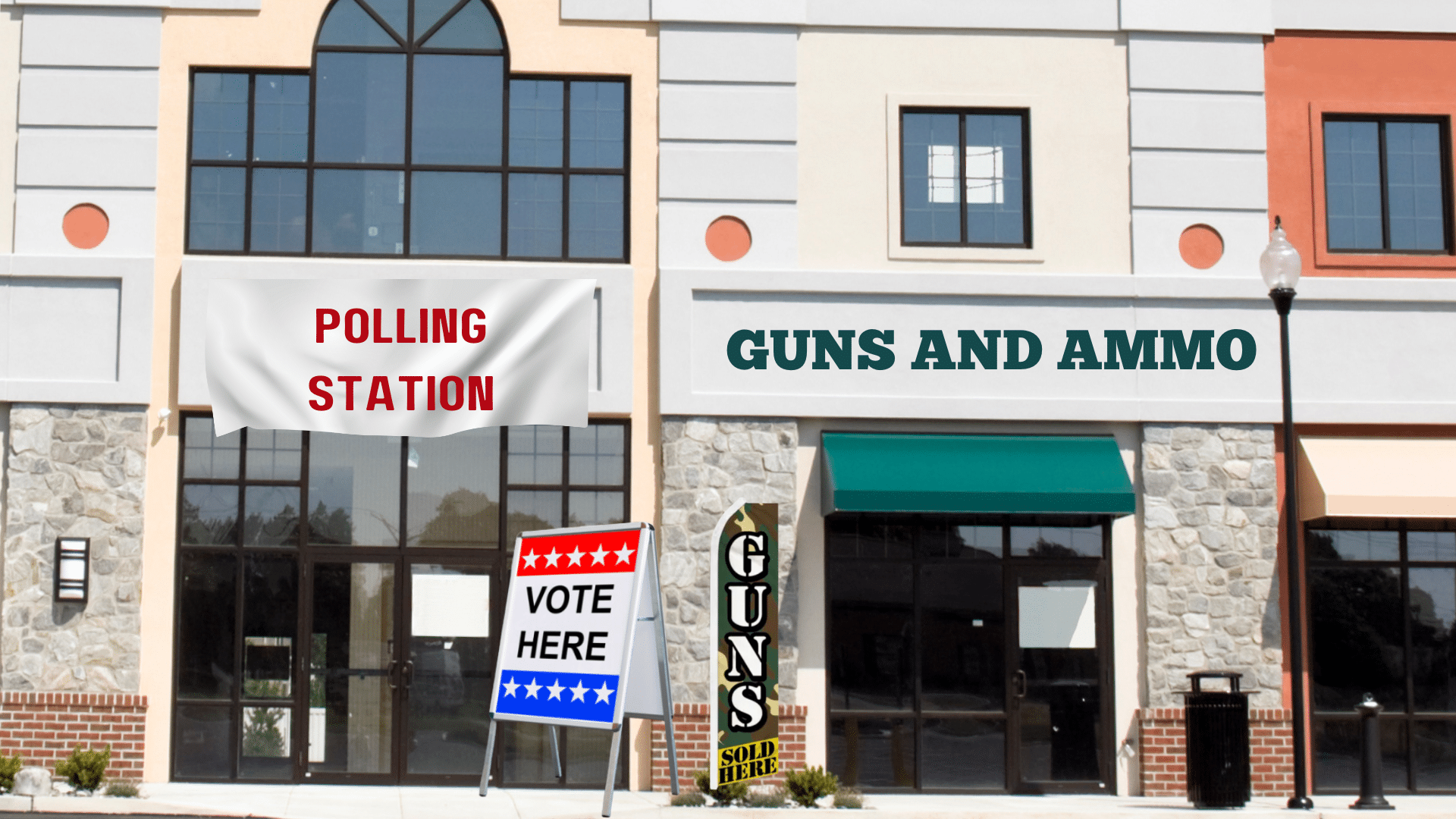If the 2020 election in the United States was any indication, there will be a lot of angry people in this go-around regardless of the result.

An imagined polling station next to a gun shop. (Illustration by News Decoder)
This article was produced exclusively for News Decoder’s global news service. It is through articles like this that News Decoder strives to provide context to complex global events and issues and teach global awareness through the lens of journalism. Learn how you can incorporate our resources and services into your classroom or educational program.
Growing up in the United States my schooling was steeped in the concept of American exceptionalism. Other countries had corrupt leaders and elections in those places had to be monitored by, well us.
When I was a young news reporter I never worried about my safety. That was something that foreign correspondents covering other countries had to worry about. I was under the impression that this wasn’t a concern within U.S. borders.
The November presidential election in the United States promises to bust that myth. A new poll in the state of Massachusetts found that an overwhelming majority of people expect major violence around the vote.
The International Women’s Media Foundation, a Washington, D.C. nonprofit, has been giving safety workshops in newsrooms all over the United States ahead of the election, particularly in some key election states.
For those new to the looniness of U.S. presidential politics, one man, one vote, exists in the United States only in concept. In reality, the winner is determined by a pot of points called the Electoral College divvied up among the 50 states, and the places like Guam, Puerto Rico and Washington, D.C. that also participate, according to the size of their populations.
Many of these states are winner-takes-all and since the majority vote in many of these states are foregone conclusions, because of the political bent of the population there, that makes those states all but irrelevant. Candidates might raise money there, but they rarely campaign.
Concentrated power in the hands of few voters
Not that long ago there were just 11 states that mattered because only their results were considered toss ups. In the United States these are called “swing states” or more appropriately, battleground states.
This year, it is generally agreed that only in seven states can the vote go either way. So while in California, you won’t likely see a single presidential campaign ad, in the state of Michigan the only way to avoid them is to stay off the Internet, turn off the television and don’t answer the phone. In these states, voters will be practically stalked by campaigns the closer we get to November.
The entire world believes this upcoming presidential election is momentous. There is a difference between the international politics of candidates Donald Trump, who has expressed the desire to leave NATO for instance, and Biden who has a long record of supporting international alliances.
Within the United States meanwhile, an awful lot of people seem personally vested in the outcome.
The Electoral College system intensifies all of this. That’s because a candidate, like Hillary Clinton in 2016, could win the nationwide popular vote by a margin of millions and lose the Electoral College and, hence, the presidency. Clinton lost the Electoral College by 77 out of 538 votes in 2016.
And that means that a voter personally vested in a candidate could see that person win the popular vote and lose the presidency. Some 75 million people would feel cheated. Trump’s voters in 2020 felt cheated even though their candidate lost both the popular vote and the Electoral College.
Reporting elections
While there are many news stories about people unhappy with both candidates in this go-around, those who do actively support Trump or Biden are so passionate that people are avoiding talking about the election for fear of instigating a screaming match, fistfight or worse.
Imagine how journalists assigned to covering this election are feeling.
The Committee to Protect Journalists keeps track of assaults on journalists each year. It is telling that in 2017, 2018 and 2019, there were fewer than 60 such assaults in the United States in each year, but in 2020, the number shot up to 640.
In journalism we used to call covering local events and issues “on the street reporting.” It was necessary, but often dull work — like covering local government meetings.
We tend to salute the courage and tenacity of war reporters and those foreign correspondents who work under oppressive conditions in places with authoritarian regimes.
This year, we need to salute the courage and tenacity of the local reporters in the United States who will cover the election in their states.
And perhaps we need to remind people everywhere: When news happens that you don’t like to hear, don’t blame the messenger. It is always worse to not know.
Questions to consider:
- What about the U.S. presidential election system might make results difficult for people to accept?
- Why might it be difficult for a journalist to cover an election?
- Is politics difficult to talk about in your school or at family gatherings?

Marcy Burstiner is the educational news director for News Decoder. She is a graduate of the Columbia Journalism School and professor emeritus of journalism and mass communication at the California Polytechnic University, Humboldt in California. She is the author of the book Investigative Reporting: From premise to publication.
Read more News Decoder stories about journalism:
